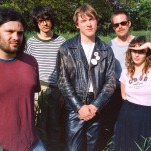Dispatch
Click here to return to the issue 33 cover story home page.
Brad Corrigan is crouching on stage, surrounded by amps, speakers and microphone cables. A crowd of rowdy college students dances below him while his Puerto Rican percussionist, Reinaldo de Jesus, and Brazilian bassist, Tiago Machado, settle into a Latin/reggae beat. Smoke drifts over them.
Only the smoke isn’t fake machine-pumped concert smoke. It’s the real thing, streaming from a 40-foot-high ridge behind Corrigan, where piles of trash have been burning all afternoon. The stage is a flatbed trailer. The rowdy, dancing students all have Nicaraguan kids perched on their shoulders, laughing and grinning and swatting at each other in the dust and haze. And Corrigan is squatting so a little cross-eyed boy—who looks about two years old, has a belly distended from malnutrition and isn’t wearing any shoes—can strum his guitar while Corrigan fingers the chords. They laugh at each other. A few seconds later, Corrigan pops back to the mic and continues the song, in Spanish.
He’s putting on a full-fledged rock concert in Managua, Nicaragua, literally in the middle of a trash dump. The North Americans in the audience are Corrigan’s friends and family, plus a few busloads of college students on a spring-break service project. The Nicaraguans enjoying the show are residents of La Chureca, a shantytown community located in the dump itself.
It’s a far cry from Madison Square Garden, where Corrigan will soon take the stage with Pete Heimbold and Chad Urmston, his old bandmates from eclectic cult-favorite indie trio Dispatch. The group is briefly reuniting for Dispatch: Zimbabwe, a three-night benefit concert, with all proceeds going to organizations fighting disease, famine and social injustice in the embattled African nation. Though these shows aren’t until mid-July, they’ve already made history. Dispatch is the first indie band to headline and sell out the Garden. Originally conceived as a one-night set, tickets for the concert were gone within the first 30 minutes of sales. So two more nights were added. They, too, sold out immediately. The band was offered additional dates but turned them down.
Which leads us to the nagging question: Who are these guys? Dispatch began in 1995, when Corrigan, Heimbold and Urmston met as students at Middlebury College in Vermont. They quickly earned a dedicated regional fan base, playing show after show in Boston and New York, and releasing several studio and live albums on their own label. They became known for their difficult-to-categorize, rock-roots-reggae fusion, intricate harmonies and instrument swapping (all three shared singing and songwriting duties, including Corrigan, who’s generally identified as Dispatch’s drummer). The trio hit its stride during the Napster file-sharing heyday, and within a few years—after the sale of a few hundred thousand independently released CDs—had become a word-of-mouth sensation on the East and West Coasts.
Then they more or less broke up in 2002, officially closing shop in 2004 with The Last Dispatch, a free outdoor performance at the Hatch Shell in Boston. An estimated crowd of 110,000 people—far more than the attendance for Phish’s farewell concert at Coventry just a few weeks later—showed up from as far away as South Africa and Australia. It’s generally considered to have been the largest independent concert in music history. The guys were stunned. “We went out on top,” Corrigan says.
Then it was over. All three embarked on solo projects. Urmston now heads up State Radio. Heimbold records as Pete Francis. Corrigan tours as Braddigan.
Which leads to yet another question: What’s with the trash-dump rock show?
“Music has always been the most powerful conveyor of social justice,” says Corrigan, who’s spent the last three years dividing his time between music and a humanitarianism fueled by his Christian faith. His platform as a musician, he says, allows him to tell the stories of suffering people and overlooked communities.
The dump village, La Chureca, is one of them. Its families typically subsist on less than a dollar a day, earning money by picking out recyclable aluminum and plastic from the garbage. Many of their kids are addicted to sniffing glue; the cheap high masks their hunger. Young girls are forced into prostitution to provide extra income for their families. And it all takes place among this heartbreakingly apocalyptic landscape of garbage, smoke and ashes.
-

-

-

-

-

-

-

-

-

-

-

-

-

-

-

-

-

-

-

-

-

-

-

-

-

-

-

-

-

-

-

-

-

-

-

-

-

-

-

-








































